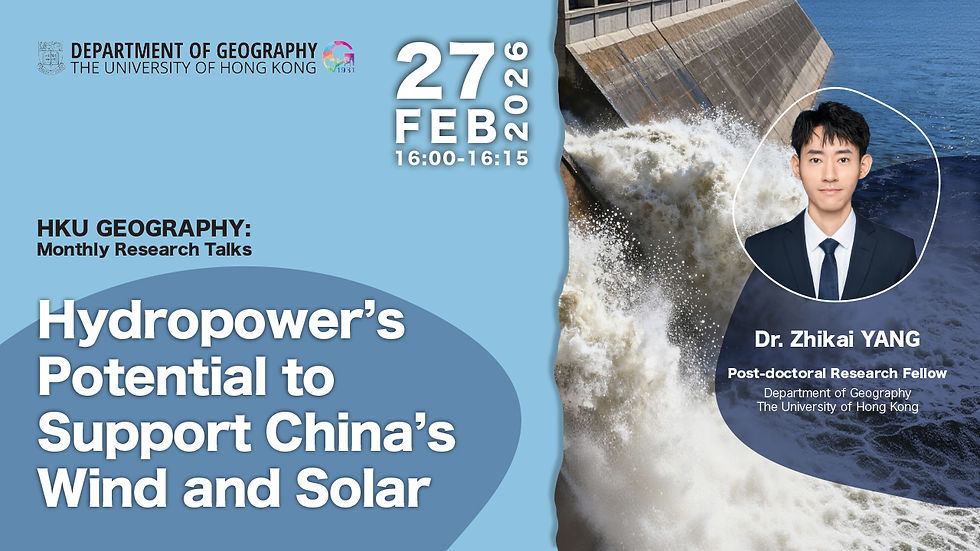22 MAY 2025 (THU) 10:35-10:55
- May 19, 2025
- 2 min read
The Pluriversal Anthropocene in Laomudeng Nu Village of Yunnan: Environmental Governance, Indigenous Knowledge and Community Economies
Mr SHEN Zijing
( Supervisor: Prof Junxi Qian )
Abstract:
In the face of these intersectional socio-ecological challenges, human geography offers profound reflections on the Anthropocene ontology and politics, calling for envisioning a pluriversal Anthropocene. On this basis, socio-cultural contingency and bottom-up agency constitute two contextualised and practical analytical perspectives. From these perspectives, this thesis explores the human-nature relationship and interaction in often neglected geographical marginal and socio-economic underdeveloped areas. Specifically, this thesis adopts a combination of longitudinal diachronic and horizontal synchronic methods with three concentrations: understanding the human-nature interaction history to understand indigenous environmental concepts and practices; examining the tension between top-down environmental governance and indigenous contexts; and analysing the heuristics of socio-cultural contexts and bottom-up actions.
Laomudeng Nu Village in Yunnan Province, an ethnic minority area with rich natural resources but low socio-economic development, serves as the case study. Specifically, this thesis: 1) addresses unique environmental history of the non-modernised, non-climate-threatened Laomudeng Village, advocating for diverse discourses beyond Western-centric climate and environment narratives; 2) reflects on the unsatisfactory top-down Grain for Green Programme, emphasising the need to prioritise local contexts and grassroots initiatives for effectiveness and justice; 3) unfolds the revolution of indigenous environmental knowledge and the localisation of tea industry, challenging colonial-decolonial binaries by centring indigenous subjectivities and context-driven revolution; 4) examines the community economies of the Laomudeng tourism industry and its tension with administrative and capitalist forces, emphasising indigenous ethical economic practices while acknowledging their fragility.
Theoretically, this thesis advocates “seeing the absence” to construct a pluriversal Anthropocene, challenging the dominant universal discourses and approaches by centring marginalised socio-ecological systems and intersectional power relations. Moreover, it prioritises indigenous socio-cultural contexts and bottom-up actions, emphasising indigenous knowledge and participatory community economies as situated, participatory alternatives to dominant paradigms. Practically, it highlights Laomudeng’s traditions as fragile yet vital seeds for a pluriversal Anthropocene, urging empowerment of indigenous subjectivities facing administrative and capitalist forces to foster equal, just and sustainable pathways through self-determination and reduced external intervention.



Comments